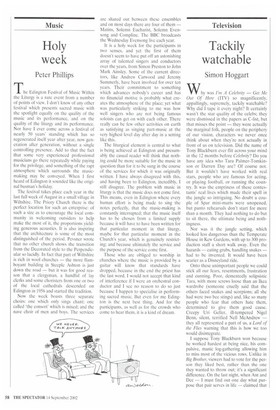Music
Holy week
Peter Phillips
The Edington Festival of Music Within the Liturgy is a rare event from a number of points of view. I don't know of any other festival which presents sacred music with the spotlight equally on the quality of the music and its performance, and on the quality of the liturgy and its performance. Nor have I ever come across a festival of nearly 50 years' standing which has so regenerated itself year after year, now generation after generation, without a single controlling presence. Add to that the fact that some very experienced professional musicians go there repeatedly while paying for the privilege, and something of the rapt atmosphere which surrounds the musicmaking may be conveyed. When I first heard of Edington it sounded like the original busman's holiday.
The festival takes place each year in the last full week of August in a small village in Wiltshire. The Priory Church there is the perfect location for such an enterprise: of such a size as to encourage the local community in welcoming outsiders to help make the most of it, the proportions yielding generous acoustics. It is also inspiring that the architecture is some of the most distinguished of the period. Pcvsner wrote that no other church shows the transition from the Decorated style to the Perpendicular so lucidly. In fact that part of Wiltshire is rich in wool churches — the more flamboyant building in Steeple Ashton is just down the road — but it was for good reason that a clergyman, a handful of lay clerks and some choristers from one or two of the local cathedrals descended on Edington in 1956 and started the tradition.
Now the week boasts three separate choirs: one which only sings chant; one called 'the consort' which is mixed; and the nave choir of men and boys. The services are shared out between these ensembles and on most days there are four of them — Matins, Solemn Eucharist, Solemn Evensong and Compline. The BBC broadcasts the Wednesday Evensong live each year.
It is a holy week for the participants in two senses, and yet the first of them doesn't seem to have put off an astonishing array of talented singers and conductors over the years, from Simon Preston to John Mark Ainsley. Some of the current directors, like Andrew Carwood and Jeremy Summerly, have been involved for over ten years. Their commitment to something which advances nobody's career and has no financial motive is probably what creates the atmosphere of the place; yet what was particularly striking to me was how well singers who are not being famous soloists can get on with each other. There really can be few other activities on earth as satisfying as singing part-music at the very highest level day after day in a setting like this.
The liturgical element is central to what is being achieved at Edington and presumably the casual reader will think that nothing could be more suitable for the music in question than for it to be sung in the course of the services for which it was originally written. I have always disagreed with this, and having been to Edington, incredibly, I still disagree. The problem with music in liturgy is that the music does not come first. This means, even in Edington where every human effort is being made to sing the notes perfectly, that the music-making is constantly interrupted; that the music itself has to be chosen from a limited supply because it will have to have been written for that particular moment in that liturgy, maybe for that particular moment in the Church's year, which is genuinely restricting; and because ultimately the service and the purpose of the service come first.
Those who are obliged to worship in churches where the music is provided by a guitar will know that standards have dropped, because in the end the priest has the last word. I would not accept that kind of interference if I were an orchestral conductor and I see no reason to do so just because I happen to specialise in performing sacred music. But even for me Edington is the next best thing. And for the participants, as well as for the crowds who come to hear them, it is a kind of dream.










































































 Previous page
Previous page